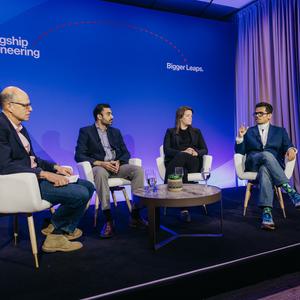The beginning of an era
Clostridioides difficile, or C. diff, is a type of bacteria that is ubiquitous in nature and can be found in the digestive system of healthy humans and animals. This common microbe, however, is classified as one of the greatest microbial threats to human health by the Centers for Disease Control and Prevention (CDC). It is responsible for about .
These potentially deadly bacteria are typically kept in check by other microbes that outcompete the bug for nutrients. The problem occurs when it is able to colonize a host and multiply out of control, producing toxins that cause diarrhea, abdominal pain, fatigue, fever, and potentially life-threatening inflammation of the colon. The underlying microbial dysbiosis is often due to antibiotic therapy that kills the favorable bacteria that typically keep C. diff at bay, and recent use of antibiotics is the primary risk factor for developing C. diff infection (CDI).
While C. diff can be acquired practically anywhere, it is a leading cause of hospital-acquired infections in the U.S, and hospitalized patients often have more trouble . Hospitalized patients may be vulnerable due to advanced age, being immunocompromised, and/or antibiotic treatment. Patients may be isolated for extended periods of time, only able to interact with staff donning gowns and gloves. These precautions are necessary to reduce the spread of the sturdy C. diff spores that are not eradicated by common sanitary procedures, such as using alcohol-based hand sanitizers.
Perhaps paradoxical, antibiotics are the primary treatment for CDI. However, one in six patients have a recurrence of the infection in the subsequent two to eight weeks, called recurrent C. diff (rCDI). Patients with rCDI demonstrate severe microbial dysbiosis, characterized by a marked loss of microbial diversity. Symptoms are thought to recur because the dysfunctional microbiome facilitates germination of the C. diff spores, which are not affected by antibiotic treatment.
These CDI infections are a major clinical challenge in which the risk of recurrence increases with each successive episode.
for treating rCDI recommend a tapered and/or pulsed regime of the antibiotic vancomycin. The intent of pulsing and/or tapering the dosage over a prolonged course of at least six weeks is to provide more time for clearance of C. diff while allowing restoration of the healthy microbiome during antibiotic-free periods. However, this regime has shown only modest efficacy and does not reliably address the underlying microbiota disruption. The FDA has recently approved a fecal microbiota transplantation (FMT) product, which is aimed at restoring microbial diversity, but more options are desperately needed for patients.
Patient experience
Much of the focus on CDI is understandably on resolving the resulting diarrhea, preventing recurrence, and reducing mortality. But the impact goes beyond the gut, having a severe effect on patients’ perception of their quality of life both during and after the infection. In one , researchers found that populations currently battling CDI and those with a history of the infection reported notable impacts to their physical, psychological, social, professional, and financial lives. As patients with active infections may have up to 15 bowel movements a day, it may be no surprise that this would leave them feeling isolated, but even about a third of patients with a history of CDI also reported that the condition still impacts their lives long after the infection had been cleared. Patients understand and fear the risk of recurrence, but therapies have thus far not adequately addressed this risk.
Modulating the microbiome
An efficacious, well-tolerated treatment that reduces the recurrence of CDI is a critical unmet need. Seres Therapeutics is focused on this need and is developing an approach to help prevent recurrence centered around modulating microbiome functions by altering the makeup of the microbial community. SER-109 is an investigational oral microbiome therapeutic composed of highly purified Firmicutes spores, which are bacterial spores that are naturally present in a healthy microbiome. The therapy is designed to restore the microbiome to a healthy state that resists C. diff colonization and growth, guarding against relapse of infection. Patients take capsules four times a day for three days following completion of a standard antimicrobial regime and a bowel wash.







